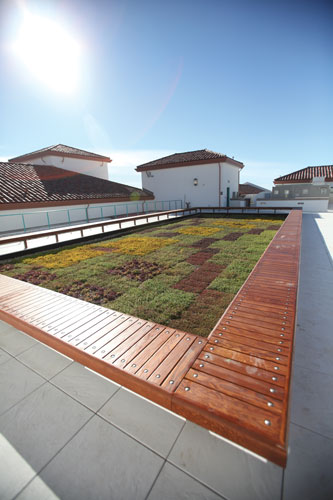
Faculty and students from the sustainability discipline at San Diego State teamed up with environmental groups to develop and implement new initiatives on campus.
Green Love, an Associated Students commission that oversees sustainable initiatives and programs on campus, aims to reduce plastic bottle waste.
Last semester, the Green Love passed a motion asking Associated Students to purchase the hydration stations that allow students and faculty to refill reusable water bottles, said Megan Goodman, the Associated Students sustainability commissioner. The commission hopes the installment will reduce disposable water bottle use on campus.
“By the end of this semester our goal is to have ten installed around campus,” Goodman said. “We purchased 15, so by the end of spring 2016 we would like to have all 15 installed on campus.”
The first two stations were installed in the Education and Business Administration buildings on the second and third floors this semester.
In the first hour, one new hydration station filled 80 bottles, Goodman said.
“On every hydration station, it shows you how many disposable bottles you’re saving by refilling a reusable one and it changes every day based on how many people used it,” she said.
Hydration stations are also located in the residence halls, Conrad Prebys Aztec Student Union and Love Library.
In a new campaign, SDSU’s Enviro-Business Society is encouraging students to use these hydration stations.
“We have a new campaign called Drink Responsibly, and it doesn’t have anything to do with alcohol,” said Daniel Kodama, co-president of the Enviro-Business Society. “It’s about not using water bottles and using refillable bottles instead. We’re really focused on making sure the hydration stations are used and people don’t just go to the student market and get single use bottles.”
Meanwhile, student-led energy efficiency group PowerSave is working with SDSU Assistant Director of Campus Sustainability Tom Abram on a Leadership in Energy and Environmental Design (LEED) certification for Nasatir Hall.
“We’re making sure all their components within energy are up to date and they’re actually implementing things and going the way students want,” said Stephanie Hernandez, senior team manager of PowerSave.
Students are working on collecting data and learning the LEED building guidelines before implementing any changes.
“For Nasatir, we already told Abram that we can start the Energy Star form that we have to start before we start the certification,” Hernandez said. “Since it’s a new building, it’s not collecting the data.”
Co-director of the sustainability program Matthew Lauer said there’s a lot of work to be done to make the campus more environmentally sustainable.
“I mean a lot of things …energy uses of buildings, landscaping, transportation … need improvement,” Lauer said. “Everything needs improvement pretty much and we’re starting to do that. The student union is LEED certified so it’s kind of a model of what we can do moving forward.”
An initiative to create a university eco-pass is in the works, which would encourage students and faculty to carpool and use the trolley on campus so that carbon waste emissions are reduced, Lauer said.
“It’s an alternative transit kind of pass so you can take the trolley at a subsidized rate,” Lauer said. “We’re kind of behind the curve on some of these things.”
Student leaders and faculty of the sustainability major say that getting the community to understand the importance of going green is the biggest hurdle for the university.
“Certain people who should be part of the discussion aren’t,” Hernandez said. “It’s hard to get people to understand that sustainability is a really important issue and will help the campus save energy, water and waste.”
Green Love is working on requiring a set of sustainability and zero waste guidelines for events held by Associated Students. Soon, Student Life and Leadership will require organizations on campus to have policies set in place before each event is approved, Goodman said.
“It’s difficult to convince people why going green and going more sustainable is the future and it’s something that needs to be taken seriously,” Goodman said. “We’re trying to really instill a better culture on campus with people being more environmentally friendly and environmentally conscious.”








